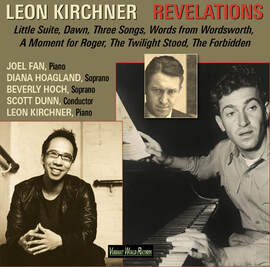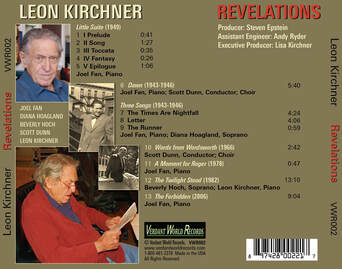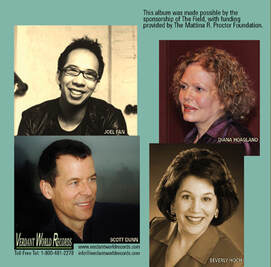LEON KIRCHNER and HIS VERDANT WORLD
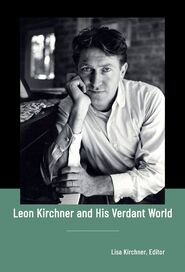
"An artist must create a personal cosmos, a verdant world in continuity with tradition further fulfilling man's 'awareness,' his ‘degree of consciousness,' and bringing new subtilization, vision and beauty to the elements of experience. It is in this way that Idea, powered by conviction and necessity, will create its own style and the singular, momentous structure capable of realizing its intent."— Leon Kirchner
Leon Kirchner and His Verdant World is an anthology of sixty-nine essays, letters, and interviews, by Kirchner and his colleagues spanning sixty years of collaboration in the arts and sciences. Reprints of earlier materials share a terrain with newly minted pieces written for inclusion in this volume by fellow composers, performers, producers, and scholars, who deliver vibrant accounts of their transformational encounters with Kirchner. The composer's own published writings—stylistically imaginative and prophetic—unveil his evolving concerns relevant to the arts and society, while also providing resonant accounts of his cherished mentors. Interleaved with photos, manuscripts, and art, this book illuminates a burgeoning era of contemporary music. Fellow travelers in his cosmos write with erudition and gift imparting their insights and consummate understanding of the tenets and qualities of Kirchner's verdant world.
Available at Verdant World Records, Verdant World Productions, Amazon
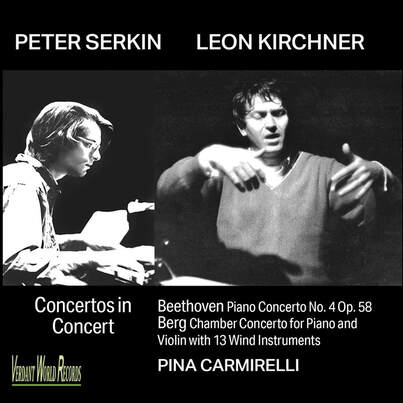
Peter Serkin, Leon Kirchner, Pina Carmirelli: CONCERTOS IN CONCERT
BERG: Chamber Concerto; BEETHOVEN: Piano Concerto 4; Peter Serkin, p; Pina Carmirelli, v; Harvard Chamber Orchestra, Marlboro Festival Players/ Leon Kirchner—Verdant World 4—71 minutes. Review by Ralph P. Locke/American Record Guide:
The multitalented and long-lived Leon Kirchner (1919-2009) was, at various times, a solo pianist (with the New York Philharmonic), a beloved teacher at Mills College and Harvard, a frequent participant at the Marlboro Music Festival, a respected composer (Pulitzer Prize 1967), and an inspiring conductor. Here are two recordings made in concert of major masterworks, with Kirchner conducting and Peter Serkin as piano soloist. The recordings have been brought together through the efforts of Lisa Kirchner, the composer's daughter, who is also a noted singer-songwriter. (See Jack Sullivan's appreciative review of one of her own CDs, "Something to Sing About” Nov/Dec 2011.) Lisa K. has also put together a major book about her father (see Book Reviews in this issue).
The Beethoven is full of fresh details and interpretive decisions, including shifts in tempo. Peter Serkin is not always perfectly in control of certain quick passages, though he's breathtakingly at ease in others. (We have become spoiled by the consistency of studio recordings.) His reading of II, ably assisted by Kirchner and his freelance players from the Boston area, is immensely poetic, taken a bit slowly. One can almost hear Kirchner and Serkin thinking, measure by measure. And the finale really cooks, with marvelously delicate playing and subtle use of the right pedal by the pianist.
For the Berg Chamber Concerto, the two Americans are joined by the renowned Italian violinist Pina Carmirelli, renowned as Concertmistress of I Musici and as founder of the Boccherini Quintet and the Carmirelli Quartet. The chamber group accompanying them is itself a constellation of masters, including flutist Paula Robison and clarinetist Richard Stoltzman. A violist is erroneously listed; Berg's orchestra here consists entirely of wind and brass, with one player per part. The work, carefully structured by Berg according to numerical and traditionally musical principles—remains a challenge to the ear even today. It uses some 12-tone principles but is not strictly serial. The performance is marvelously secure, the sound vividly captured. I enjoyed the work more than in any recording I've encountered before.
There are excellent, informative notes by musicologist Robert Riggs, whose acclaimed biography of Kirchner is available from University of Rochester Press. The three movements of the Berg are played without pause, as indicated by the composer. Still, I'd have liked separate track numbers to help me navigate. The recording can be purchased at verdantworldrecords.com or by phoning 917-338-6057. - Ralph P. Locke/American Record Guide
At the beginning of this month, Verdant World Records released Concertos in Concert, a fascinating document of live performances of concertante music featuring pianist Peter Serkin and conductor Leon Kirchner. ... the album being discussed is available in its entirety, along with a highly informative PDF booklet...The program for this album is one of striking contrasts. It begins with a performance of Ludwig van Beethoven’s Opus 58 (fourth) piano concerto in G major. The performance took place on July 23, 1984, at Harvard University. The second selection is the composition that Alban Berg called “Kammerkonzert” (chamber concerto). The solo parts were taken by both piano and violin (Pina Carmirelli); and the ripieno ensemble consisted of thirteen different wind instruments. This performance took place during the 1971 Marlboro Music Festival. The back cover of the album lists all of the players, two of whom are likely to be familiar to those following chamber music recitals, flutist Paula Robison and Richard Stoltzman playing E-flat clarinet....There are many different approaches to creating a concerto, but what is most important is the relationship that is established between the soloist(s) and the ensemble. That relationship has endured a wide variety of changes over the course of music history. One of those changes highlights Beethoven’s Opus 58 with its bold (at the time) decision to allow the soloist the “first word,” rather than keeping him/her waiting through a prolonged orchestral introduction .... in Concert is an album through which the attentive listener can appreciate a sampling from that ongoing cycle of changes. In my case it helps me build my appetite for further changes, and I hope that other attentive listeners may react the same way. Stephen Smoliar/The Rehearsal Room
BERG: Chamber Concerto; BEETHOVEN: Piano Concerto 4; Peter Serkin, p; Pina Carmirelli, v; Harvard Chamber Orchestra, Marlboro Festival Players/ Leon Kirchner—Verdant World 4—71 minutes. Review by Ralph P. Locke/American Record Guide:
The multitalented and long-lived Leon Kirchner (1919-2009) was, at various times, a solo pianist (with the New York Philharmonic), a beloved teacher at Mills College and Harvard, a frequent participant at the Marlboro Music Festival, a respected composer (Pulitzer Prize 1967), and an inspiring conductor. Here are two recordings made in concert of major masterworks, with Kirchner conducting and Peter Serkin as piano soloist. The recordings have been brought together through the efforts of Lisa Kirchner, the composer's daughter, who is also a noted singer-songwriter. (See Jack Sullivan's appreciative review of one of her own CDs, "Something to Sing About” Nov/Dec 2011.) Lisa K. has also put together a major book about her father (see Book Reviews in this issue).
The Beethoven is full of fresh details and interpretive decisions, including shifts in tempo. Peter Serkin is not always perfectly in control of certain quick passages, though he's breathtakingly at ease in others. (We have become spoiled by the consistency of studio recordings.) His reading of II, ably assisted by Kirchner and his freelance players from the Boston area, is immensely poetic, taken a bit slowly. One can almost hear Kirchner and Serkin thinking, measure by measure. And the finale really cooks, with marvelously delicate playing and subtle use of the right pedal by the pianist.
For the Berg Chamber Concerto, the two Americans are joined by the renowned Italian violinist Pina Carmirelli, renowned as Concertmistress of I Musici and as founder of the Boccherini Quintet and the Carmirelli Quartet. The chamber group accompanying them is itself a constellation of masters, including flutist Paula Robison and clarinetist Richard Stoltzman. A violist is erroneously listed; Berg's orchestra here consists entirely of wind and brass, with one player per part. The work, carefully structured by Berg according to numerical and traditionally musical principles—remains a challenge to the ear even today. It uses some 12-tone principles but is not strictly serial. The performance is marvelously secure, the sound vividly captured. I enjoyed the work more than in any recording I've encountered before.
There are excellent, informative notes by musicologist Robert Riggs, whose acclaimed biography of Kirchner is available from University of Rochester Press. The three movements of the Berg are played without pause, as indicated by the composer. Still, I'd have liked separate track numbers to help me navigate. The recording can be purchased at verdantworldrecords.com or by phoning 917-338-6057. - Ralph P. Locke/American Record Guide
At the beginning of this month, Verdant World Records released Concertos in Concert, a fascinating document of live performances of concertante music featuring pianist Peter Serkin and conductor Leon Kirchner. ... the album being discussed is available in its entirety, along with a highly informative PDF booklet...The program for this album is one of striking contrasts. It begins with a performance of Ludwig van Beethoven’s Opus 58 (fourth) piano concerto in G major. The performance took place on July 23, 1984, at Harvard University. The second selection is the composition that Alban Berg called “Kammerkonzert” (chamber concerto). The solo parts were taken by both piano and violin (Pina Carmirelli); and the ripieno ensemble consisted of thirteen different wind instruments. This performance took place during the 1971 Marlboro Music Festival. The back cover of the album lists all of the players, two of whom are likely to be familiar to those following chamber music recitals, flutist Paula Robison and Richard Stoltzman playing E-flat clarinet....There are many different approaches to creating a concerto, but what is most important is the relationship that is established between the soloist(s) and the ensemble. That relationship has endured a wide variety of changes over the course of music history. One of those changes highlights Beethoven’s Opus 58 with its bold (at the time) decision to allow the soloist the “first word,” rather than keeping him/her waiting through a prolonged orchestral introduction .... in Concert is an album through which the attentive listener can appreciate a sampling from that ongoing cycle of changes. In my case it helps me build my appetite for further changes, and I hope that other attentive listeners may react the same way. Stephen Smoliar/The Rehearsal Room
DOWNLOAD, STREAM, AND BUY CONCERTOS IN CONCERT
Concertos in Concert Apple Music
https://music.apple.com/us/album/concertos-in-concert-live/1505869054
Concertos in Concert Spotify
https://open.spotify.com/album/1Tzi2557gULL6Ma6rwV5DL?si=2HkvLhyrQy-_sqebHL_cjA
Concertos in Concert Apple Music
https://music.apple.com/us/album/concertos-in-concert-live/1505869054
Concertos in Concert Spotify
https://open.spotify.com/album/1Tzi2557gULL6Ma6rwV5DL?si=2HkvLhyrQy-_sqebHL_cjA
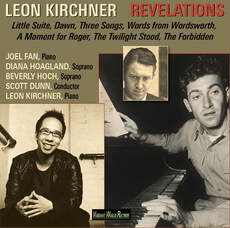
LEON KIRCHNER REVELATIONS
“Revelations” is an apt title for this important recording of diverse works — piano pieces, songs, choral works, most of them little known — by the American master composer Leon Kirchner, who died at 90 in 2009. Kirchner’s music draws elements from his teacher Schoenberg, his mentor Stravinsky, and other 20th-century modernists, fashioned into his own rigorous, expressive voice. From Kirchner’s early Little Suite for piano (1949) to his last piece, “The Forbidden” (2006), in its version as the Piano Sonata No. 3, the music is alluring, pungent and intelligent, especially in these fine performances, most of them featuring the impressive pianist Joel Fan.
- Anthony Tommasini/New York Times
“Revelations” is an apt title for this important recording of diverse works — piano pieces, songs, choral works, most of them little known — by the American master composer Leon Kirchner, who died at 90 in 2009. Kirchner’s music draws elements from his teacher Schoenberg, his mentor Stravinsky, and other 20th-century modernists, fashioned into his own rigorous, expressive voice. From Kirchner’s early Little Suite for piano (1949) to his last piece, “The Forbidden” (2006), in its version as the Piano Sonata No. 3, the music is alluring, pungent and intelligent, especially in these fine performances, most of them featuring the impressive pianist Joel Fan.
- Anthony Tommasini/New York Times
JOEL FAN, piano; LEON KIRCHNER, piano; SCOTT DUNN; conductor DIANA HOAGLAND, soprano; BEVERLY HOCH, soprano; VERDANT WORLD RECORDS CHORUS
DOWNLOAD, STREAM, AND BUY REVELATIONS
https://www.amazon.com/Leon-Kirchner-Revelations/dp/B00B2LCCPC/
https://store.cdbaby.com/cd/leonkirchnerrevelations
https://store.cdbaby.com/cd/leonkirchnerrevelations
verdantworldrecords.org
Affiliate site of verdantworldrecords.com under construction
©Verdant World Records 2018
Affiliate site of verdantworldrecords.com under construction
©Verdant World Records 2018


